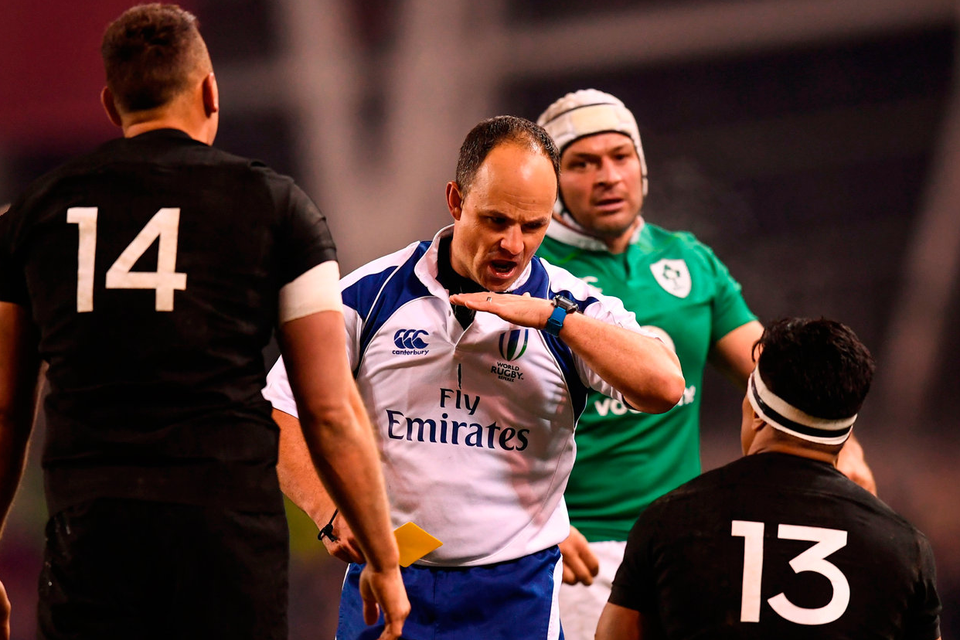Joe Brolly: Stagnant GAA must learn from the way rugby eliminated cynicism and boosted attendances
Malakai Fekitoa of New Zealand is shown a yellow card by referee Jaco Peyper during the Autumn International match between Ireland and New Zealand at the Aviva Stadium. Photo: Stephen McCarthy/Sportsfile
Mickey Harte said during the week on BBC Radio Ulster that Gaelic football should be an exhibition game at the next Olympics. If his Tyrone team are playing, it'll be the last time the Japanese go.
It was Mickey, after all, who famously said a few years ago: "Tyrone are not in the business of entertainment." You don't say Mickey. We've got so used to it that we didn't even mind Mayo v Tyrone in last year's semi-final (neither team scored in the last eight minutes, Mayo didn't even take a shot and Tyrone had a few long-range half-hearted hoofs). Or Tyrone v Donegal in the Ulster final. Zzzzzzzzzzzzzz.
Never mind tourists, people here are turning away in their droves. Over the last five or six years, what has happened at Celtic Park is shocking. Derry football teams used to be exciting to watch. We haven't won an Ulster title since 1998 but it didn't stop us going to Celtic Park for the League games and hugely enjoying them. Or having a go in the Championship. At least we played with style and passion. Nowadays, Celtic Park is more or less empty for League Sundays, a dwindling number of us turning up out of a sense of loyalty, chatting amongst ourselves as the lads shuffle slowly up the field hand-passing, then drop back into their defensive shell. A sort of GAA Groundhog Day.
The same pattern emerges across the country. The GAA recently released the annual attendance figures for the Championship, showing another sharp fall. The average attendance for the 2016 championship was 13,416. In 2007, the average attendance was 20,172. The big slump began in 2011/12 and has continued ever since. Only 788,746 spectators turned up for the Championship last year. In 2010, the figure was well over a million.
Since 2011, the blanket defensive system has ruined the game, turning it into a soulless labour. Yet the rule makers have done nothing about it. So we have seen the game nose-dive.
Mickey Harte and others argue vehemently that the game is great and shouldn't be tinkered with. 'There's far too many cards' is another mantra. The game is 'impossible to referee'. There is 'no consistency'. When a black card is given it's a national controversy.
Diarmuid Connolly said recently I was "a clown" for supporting the black card and that there was no need for it, which suited him fine when the officials didn't see him dragging down Ryan McHugh in the All-Ireland quarter-final. But come the replayed final, he adopted a different approach. When Lee Keegan took him to ground, Diarmuid went right up into the referee's face and signalled for the black card. But Diarmuid, I thought there was no need for it . . .
The truth is that the black card was only supposed to be a starting point. There are multiple obvious problems with it (too lenient, no effect in the last quarter, favours stronger squads, inadequate punishment for preventing a goal-scoring opportunity etc) but nothing has been done.
Compare our inertia with rugby. They set out around 20 years ago to do two things: Improve the game as a spectacle and get rid of cynical play. In that 20-year period, they have transformed the game, creating a flood of new rules and a rule book that is as complex as the rules of chess. Always reviewing. Always acting decisively.
The result? The game looks great and their attendance figures have gone through the roof. Cynical play has been eradicated, because the punishments are so harsh it is no longer worth it. Not in our game. As Sean Cavanagh put it in an interview with Sean Moran after the introduction of the black card: "Maybe if you were getting a red card and it's deemed a professional foul and you're going to miss a game, you definitely would think twice about it. But as it is, you probably just take one for the team and it's just the way players will use the rule to their advantage every now and again."
In rugby, cynicism is not an option. The average score against the offending team during a sin-bin period is 10 points. The spectators go in their droves. The game is on the crest of a wave. The legislators are going flat out, constantly taking decisive, logical action to improve the game. The players respect the officials because if they don't the consequences are dire.
Yet rugby is perhaps the most complex field game in the world to referee. Different referees have differing interpretations of the rules. You'll regularly hear commentators and pundits saying "you'd get away with that in the southern hemisphere" or "their interpretation of the rucking laws is right on the line". In spite of the wide margin of discretion given to the referees, they are left to do their job.
This weekend alone, five new rules came into force, initially on a trial basis. World Rugby explains the rationale behind the rules as follows: "To make the game as enjoyable as possible for the participants. To make it as enjoyable as possible for the spectators. To penalise cynicism and negativity. To speed up the game." I won't set out all five, but just a few will give a flavour of how seriously they approach the problems in their game compared to us, and how carefully they scrutinise them to eradicate negativity and promote enjoyable play.
Law 5 Time - Add to 5.7 (e) If a penalty is kicked into touch after time has elapsed without touching another player, the referee allows the throw-in to be taken and play continues until the next time the ball becomes dead.
Reasoning: To discourage teams from infringing in the dying moments of the game.
Law 9 Method of scoring - 9.A.1 (points values) Penalty try. If a player would probably have scored a try but for foul play by an opponent, a penalty try is awarded. No conversion is required. Value of the penalty try: 7 points.
Reasoning: To discourage teams from illegally preventing a probable try while also saving time on the clock by negating the need for a conversion.
Law 8 Advantage - Add to 8.1(a) When there are multiple penalty infringements by the same team, the referee may allow the captain of the non-offending team to choose the most advantageous of the penalty marks.
Reasoning: To discourage repeat offending when advantage is already being played and to reward teams against whom repeat offending has taken place.
Then there is the new Law 3.6 (h) on uncontested scrums after a sending off, new Law 19 on Touch and Line-out etc, all part of a constant, rolling programme of change and improvement designed to create a better game for the players and spectators.
In July last year, seven major rule changes came in, including one on feigning. Here's what it says: "Any player who dives or feigns injury in an effort to influence match officials will be liable to sanction. (Yellow - sin bin.)" The offender can also be cited and suspended. Their philosophy is manliness and they do not mess around. So feigning is as rare as a long kick-pass in Tyrone.
I contacted Tommy Bowe. He couldn't remember one. Nor could Trevor Ringland. I rooted around and eventually found this example. Stade Francais second-row Pascal Pape was cited by the commissioner following their game against Edinburgh on December 10 just past, for "falling to the ground in an exaggerated manner after being struck by Edinburgh centre Phil Burleigh." After being struck in the face, he made a slight meal of his fall, and the law came down on him like a ton of props. In our game, meanwhile, feigning/simulation is a yellow card.
It's hard not to be envious. Rugby has a mature, confident, logical culture. And they have reaped the dividends. Meanwhile, we are stuck watching two teams hand-passing their way up field then shuffling back into a ten or 12-man defence, with single or double sweepers on the square.
Alongside these multiple playing rule innovations, rugby have taken many other steps to promote attacking play and improve the spectacle. The value of a try was increased from four points to five. Bonus points are awarded to both teams for scoring four tries or more.
They have had the TMO for years because they want to get it right. Secondly, they want to command public confidence. Thirdly, and this is linked to the second point, they want the process of decision making to be transparent. So, the referee is miked up. His words are broadcast. The big screens in the stadium show replays of disputed incidents. But the key to all of the above is the TMO, sitting in front of the TV monitors in the broadcaster's truck or studio. Justice is not only done, but seen to be done. The fact that it is transparent is crucial, since even if the onlooker disagrees with the ultimate decision, he can see precisely how it was reached.
Meanwhile, in Gaelic games, we are entirely excluded from the decision making process. When an incident occurs, the big screens automatically switch from the action to ads for Supervalu or McDonalds. Being treated like kids only increases our anger and frustration. We feel enraged and impotent. "For Jesus' sake," we say, "he clearly hand-tripped him" or "it was definitely a penalty."
Twenty years ago, rugby was a negative, attritional bore, with dwindling attendances. Now, at the elite level, it is booming. In that time, our game has become a negative, attritional bore. Our solution? The mark.
Join the Irish Independent WhatsApp channel
Stay up to date with all the latest news















